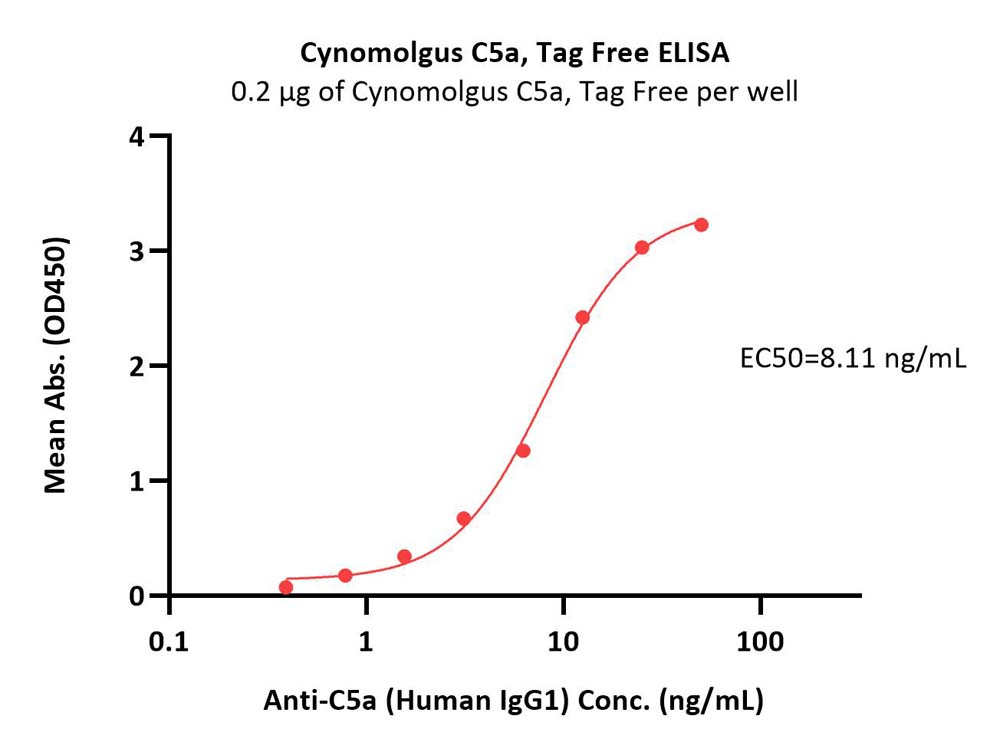分子别名(Synonym)
C5a,Complement Component 5a
表达区间及表达系统(Source)
Cynomolgus Complement C5a, Tag Free (C5A-C5118) is expressed from E. coli cells. It contains AA Met 678 - Arg 751 (Accession # XP_015292262.1).
Predicted N-terminus: Met 678
Request for sequence
蛋白结构(Molecular Characterization)

This protein carries no "tag"
The protein has a calculated MW of 8.4 kDa. The protein migrates as 11 kDa under reducing (R) condition (SDS-PAGE).
内毒素(Endotoxin)
Less than 1.0 EU per μg by the LAL method.
纯度(Purity)
>95% as determined by SDS-PAGE.
制剂(Formulation)
Lyophilized from 0.22 μm filtered solution in PBS, pH7.4 with trehalose as protectant.
Contact us for customized product form or formulation.
重构方法(Reconstitution)
Please see Certificate of Analysis for specific instructions.
For best performance, we strongly recommend you to follow the reconstitution protocol provided in the CoA.
存储(Storage)
For long term storage, the product should be stored at lyophilized state at -20°C or lower.
Please avoid repeated freeze-thaw cycles.
This product is stable after storage at:
- -20°C to -70°C for 12 months in lyophilized state;
- -70°C for 3 months under sterile conditions after reconstitution.
电泳(SDS-PAGE)

Cynomolgus Complement C5a, Tag Free on SDS-PAGE under reducing (R) condition. The gel was stained with Coomassie Blue. The purity of the protein is greater than 95%.
活性(Bioactivity)-ELISA

Immobilized Cynomolgus Complement C5a, Tag Free (Cat. No. C5A-C5118) at 2 μg/mL (100 μL/well) can bind Anti-C5a (Human IgG1) with a linear range of 0.8-13 ng/mL (QC tested).
Protocol
背景(Background)
Complement Component C5a (C5a) is also known as C5,and is a protein fragment released from complement component C5.,is a potent chemotactic factor for human peripheral blood neutrophils and monocytes, and is believed to play an important role in a number of inflammatory conditions. There are several functions in the below: C5a is an anaphylatoxin, causing the release of histamine from mast cells; C5a is effective leukocyte chemoattractants, causing the accumulation of white blood cells, especially neutrophil granulocytes, at sites of complement activation; C5a activates white blood cells by increasing avidity for white blood cell integrins and upregulating the Lipoxygenase pathway for arachidonic acid metabolism; C5a is a powerful inflammatory mediator, and seems to be a key factor in the development of pathology of many inflammatory diseases involving the complement system; C5a modulates balance between activating versus inhibitory IgG Fc receptors on leukocytes, thereby enhancing autoimmune response.























































 膜杰作
膜杰作 Star Staining
Star Staining











